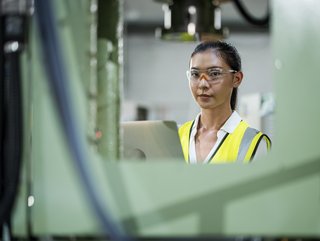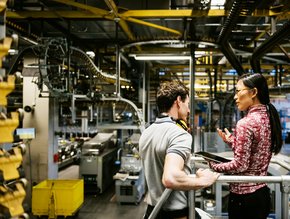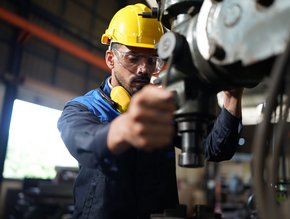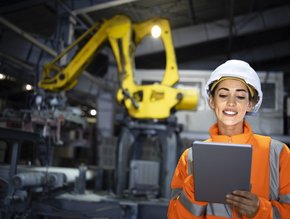
The Paris Agreement calls for a 1.5°C cap on global warming. To achieve this, emissions need to be reduced by 45% by 2030 and reach net zero by 2050 according to the United Nation’s Net Zero Coalition.
“Today’s consumer asks even more than before for sustainability. They want to know that we are treating the planet well, they want to know we’re taking care of the next generation,” says Nestlé CEO Mark Schneider.
We’ve compiled our Top 10 Sustainable Manufacturers from industries including transport, food and beverage, fashion, and more, taking a deep dive into sustainability plans from some of the top performers in manufacturing working to achieve these global goals while remaining at the top of their fields.
10: Schnitzer Steel
Portland-based sustainability-award-winning Schnitzer Steel is heading to a low-carbon future – in 2022, it recycled more than 5mn metric tonnes of metals, which avoided approximately 5.5mn metric tonnes of CO2e emissions, and maintained 100% net carbon-free electricity use across operations.
Schnitzer Steel has recently launched GRN Steel, a line of net-zero carbon emissions steel products and sold 465,000 short tonnes of finished steel products made from recycled ferrous metals in 2022, as reported in the company’s 2022 Sustainability Report.
9: Stella McCartney
International fashion brand Stella McCartney has been known for its vegetarian choices since it was founded in 2001. It famously boycotts materials including leather, feathers, and fur, in favour of alternatives it created from sustainable alternatives including grape waste and recycled industrial materials.
In 2021, it was the only brand from the fashion industry to attend COP26; more recently, in 2023, the brand released its first garment designed to be returned and regenerated into new yarn at its end of life.
8: Arçelik
Turkish electronics manufacturer Arçelik has had a sustainable focus since it was founded in 1955 with the mission: ‘Respects the Globe, Respected Globally’. The company is committed to reach net-zero emissions in the value chain by 2050.
“If we wish to ensure a sustainable future, we must learn to act together,” says CEO Hakan Bulgurlu – discussing Arçelik’s role as an early adopter within the United Nations Global Compact and its commitment to the Race to Zero campaign.
7: Dassault Systèmes
Dassault Systèmes is a sustainability-focused technology company that provides collaborative virtual environments in which to imagine sustainable innovations.
It commits to achieving climate neutrality by 2040 and has been ranked by Corporate Knights in the 2021 Top 100 Most Sustainable Corporations in the World.
Florence Verzelen, Executive Vice-President, Industry, Marketing & Sustainability, says: “We believe that climate change is not only one of the world’s greatest risks, it is also one of the greatest opportunities in history for sustainable innovation.”
6: Patagonia
Since 1985, Patagonia has pledged 1% of sales and contributed over US$100mn in grants to the preservation and restoration of the natural environment.
Internally, Patagonia’s Supply Chain Environmental Responsibility Program measures, reduces and eliminates environmental impacts of manufacturing throughout suppliers and manufacturing. Successes include:
- 98% of the line uses recycled materials
- 86% of the products in the line are Fair Trade Certified
- In 2020, Patagonia repaired over 100,000 garments
- Patagonia has kept 935 tonnes of plastic waste from the oceans by recycling discarded fishing nets.
5: Vestas
Danish wind turbine manufacturer Vestas is a global leader in sustainable energy solutions.
Recently ranked the second most sustainable company in the world by The Corporate Knights Index, its sustainability promises include becoming carbon neutral – without using carbon offsets – by 2030 and producing zero-waste wind turbines by 2040.
Vestas are also global energy pioneers: during the pilot programme of the first hydrogen-powered offshore service vessel in the world, Vestas saved 9.3 tonnes compared to a traditional vessel.
4: Peugeot
Vehicle manufacturers Peugeot believe that sustainability is a responsibility in every part of the product’s lifecycle.
In production, vehicles are made up of an average 30% green materials. During use, they are designed to be environmentally friendly and the company is continuously developing clean technologies. Once the cars are off the road, Peugeot’s end-of-life recycling scheme – for vehicles of all makes – aims to achieve a 95% recovery rate, with at least 85% reuse of parts and recycling of materials.
3: BMW
German vehicle manufacturers BMW are pioneers in sustainable vehicle development down to every detail.
With no methane gas production, no waste tannery water, huge saving on CO2, and faux-leather seats – made out of recycled cactus – are within the luxury brand’s standard for sustainability and comfort.
Oliver Zipse, Chairman of the Board of Management, says: “Sustainability and economic success go hand in hand at the BMW Group. As a premium manufacturer, we have the ambition to lead the way in the area of sustainability.”
2: Nestlé
As the world’s largest food and beverage company, Nestlé believes in the power of food to enhance quality of life for everyone – today and for generations to come.
Among other goals, it aims to:
- Halve greenhouse gas emissions by 2030 and achieve net zero by 2050
- Use 100% deforestation-free primary supply chains for key ingredients by 2025
- Reduce water use in factories by 6mn m3 between 2021 and 2023
- Source 20% of key ingredients through regenerative agriculture methods by 2025 and 50% by 2030
- Design over 95% of plastic packaging for recycling by 2025, and continue to work toward 100% being recyclable or reusable
“The younger, the better educated, and the wealthier the consumer, the more interested they are in environmentally-sound products and practices,” says Nestlé CEO Mark Schneider, discussing financing sustainable practices. “These days, there’s total transparency about your supply chain, so people do understand what you’re doing for the planet, and they reward the companies that are leading this trend.”
1: Unilever
Unilever's focus on sustainability covers its products, supply chain, partners, and global governance – and, with a staggering 3.4bn people globally using Unilever’s 400-plus brand names every day, the impact that such brand corporations can have is crucial.
Unilever is pushing towards zero emissions in its operations by 2030, and net zero emissions across its value chain by 2039, alongside finding new low-carbon ingredients, expanding its plant-based product range and developing fossil-fuel-free cleaning and laundry products.
“Our view is if we want to be a relevant business for decades and centuries to come, we better address the wishes and needs of young consumers. And for sure, sustainability is at the heart of their brand choices,” says Alan Jope, CEO. “I think ten years ago we did not fully understand the business case for sustainability, and now we do. Ultimately, there is no sustainable Unilever without a sustainable planet.”






